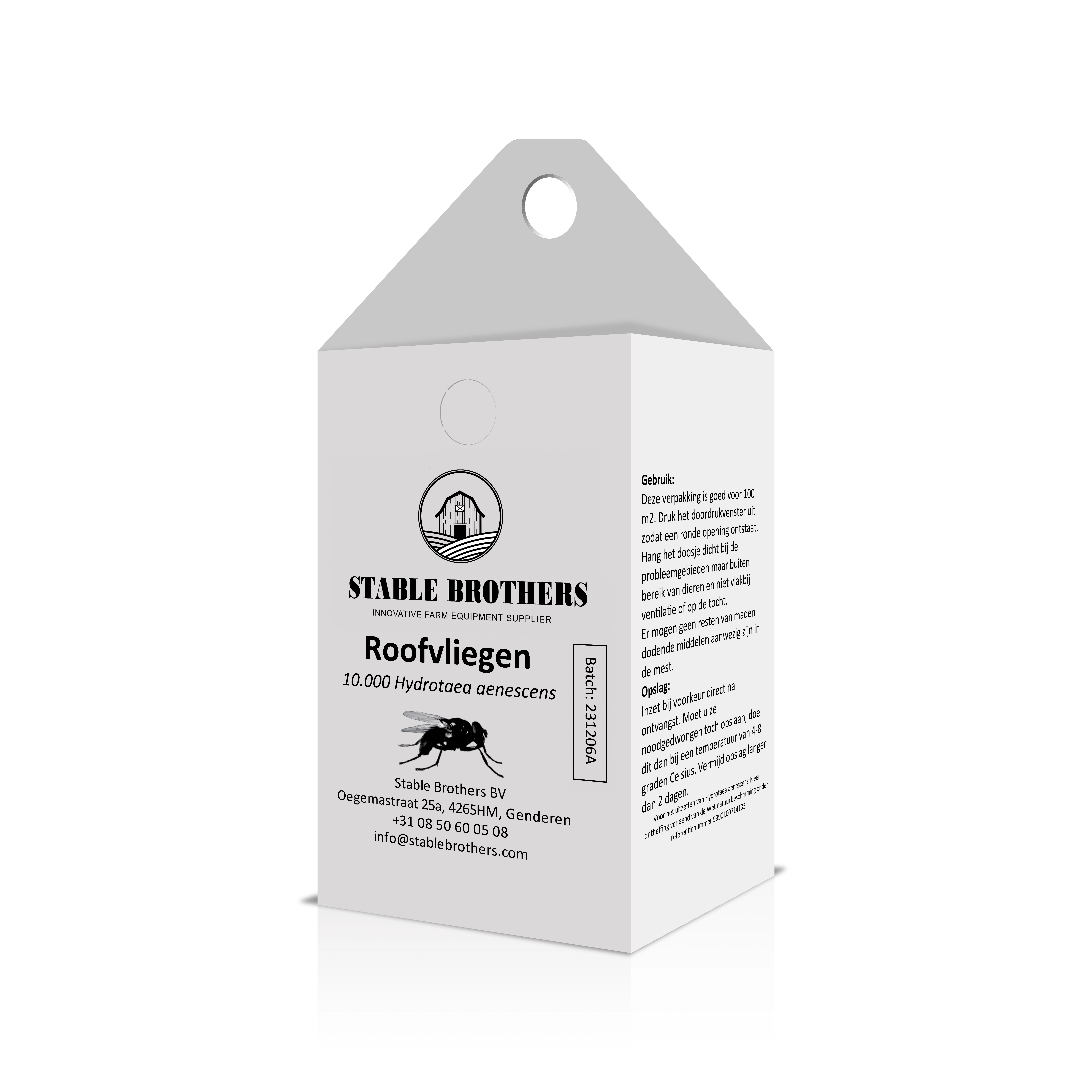Robber flies
Back to categoryIn the fight against pest flies in the stable, predatory flies are a powerful, natural ally. These little helpers, known as Hydrotaea (Ophyra) aenescens, offer an ecologically responsible and user-friendly solution in livestock farming, without inconveniencing people and animals. At Stable Brothers you can now buy these predatory flies to naturally combat pest flies in your stable. We can also draw up a complete treatment plan together with you, please contact us directly!
Product features

Product advantages
Description
Pest flies are a known problem in every stable. They can cause stress to livestock and transmit diseases. The use of predatory flies against these flies offers an effective solution to this.
What are Robber Flies?
Predator flies are natural enemies of pest flies. They form a crucial link in the ecological chain due to their unique ability to combat fly larvae. These small but mighty insects lay their eggs in the same places as pest flies, allowing their larvae to directly attack the pest fly larvae. This process leads to a significant reduction in the pest fly population, without the use of harmful chemicals.
The Benefits of Predatory Flies in your Stable
Predatory flies bring a series of benefits to livestock farming:
- Direct Approach to Pest Flies : They effectively combat pest flies by using their natural enemies.
- No Nuisance to People and Animals : Predatory flies do not disturb your livestock or you.
- Minimal Labor Required : Using predatory flies requires little labor.
- No Development of Resistance : Unlike chemicals, pest flies do not develop resistance to predatory flies.
- Environmentally friendly : They are a sustainable choice that does not burden the environment.
How do predatory flies work?
The process of predatory flies against pest flies is both fascinating and effective. After the predatory flies have laid their eggs, larvae grow from these eggs. These larvae feed on the larvae of other flies that live in the dung. This interrupts the life cycle of the pest flies and prevents new outbreaks. Stable Brothers' predatory flies are supplied in tubes of 5,000 or 10,000 pupae, depending on the size of the area to be treated. The predatory flies are especially effective in slurry systems for pigs and calves. You can use our Parasitic Wasps for solid manure, such as for chickens, goats and horses.
Application in Practice
For effective use of predatory flies in your stable:
- Place the tube with predatory flies where the fly nuisance is the worst. Consider above manure slats on dairy farms, a place where predatory flies thrive.
- Remove the lid for gradual release.
- Provide initial colony building followed by maintenance doses for continuous monitoring.
IMPORTANT: Natural fly control works best in enclosed spaces!
Within 2 to 5 days after hanging the tubes, the adult predatory flies will emerge. They are then immediately ready to get to work: they lay their eggs on the manure, where their larvae will attack the fly larvae.
Building an Effective Population
To develop and maintain a robust population of predatory flies, it is essential to use the tubes several times a year. Here is an advice schedule for the starting year:
- Start in March/April.
- Insert the tubes for the first three times every 14 days.
- Then continue with an application every 4 weeks.
- In the first year, the tubes are used a total of 6 times.
In subsequent years, placing the tubes once every 13 weeks is usually sufficient to maintain the population.
Best Practices for the Use of Predatory Flies
Successful use of predatory flies requires attention to some details in your stable management:
- Removing Spilled Feed : Do this at least once a week. This forces stable flies to reproduce in the manure.
- Manure moisture management : The manure should not be too dry, because predatory flies lay their eggs at the boundary between dry and wet. Make sure the manure is moistened regularly, but always maintain a thin layer of crust.
- Manure management : Avoid mixing manure and always leave about ten centimeters of manure in the cellar to maintain the population of predatory flies.
- Early Deployment : Start early in the season to build an effective colony.
- Monitoring : Keep an eye on the effectiveness and population of the predatory flies.
The Stable Fly: An Annoying Pest in Livestock Farming
Let's also take a closer look at what exactly a stable fly is. These flies are not only a source of irritation for your livestock, but can also transmit diseases. Understanding their life cycle is crucial for effective control:
- Egg stage : Lasts about 24 hours.
- Larva in Moulting Phase : This phase lasts a total of about 7 to 14 days.
- Adult Fly : Lives 1 to 3 weeks.
Stable flies thrive in moist, decomposing organic matter. Their favorite breeding grounds are droppings mixed with straw, hay, soil or grain residues, as well as wet straw, grass clippings and poorly maintained compost heaps. A female fly can lay up to 800 eggs during her lifetime. For each new brood she needs a fresh blood meal, for which she harasses your livestock. It is therefore extremely important that you tackle these pest flies in your stable.
Important information
It is essential to know that predatory flies are intended for professional use in livestock farming and are not suitable for home use. In addition, the dolls are not returnable or exchangeable.
About Stable Brothers
At Stable Brothers, we are committed to providing sustainable, innovative solutions for the livestock industry. The robber fly is an excellent example of our efforts to provide environmentally friendly control methods. In addition to quality products, we also offer expert support and advice. For additional support, questions or advice you can always contact us.









